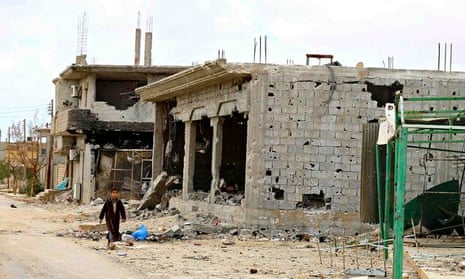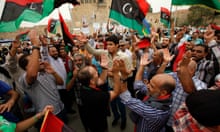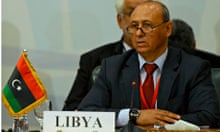“Widespread and gross” human rights violations in Libya, including disappearances, arrests, torture and deaths, have left nearly a third of the population suffering from mental health problems as violence and lawlessness continues, according to a new report.
Research by Dignity – the Danish Institute against Torture – shared with the Guardian, paints a devastating picture of the human consequences of the regionalism, tribalism and factionalism that have wracked the north African country since the overthrow of Muammar Gaddafi three-and-a-half years ago.
A fifth of households (20%) had a family member who had disappeared, 11% reported having a household member arrested and 5% reported that one had been killed, researchers found. Of those arrested, 46% reported beatings, 20% positional torture or suspensions and 16% suffocation. Between 3% and 5% reported having suffered sexual, thermal or electrical torture.
“Our data supports the allegations that widespread … and gross human rights violations have taken place in Libya,” says the report, which seeks to assess Libya’s mental health needs and was co-authored with Benghazi University. The survey is based on 2,692 household interviews and was completed in October 2013. The situation may have got worse since then, it concludes.
Data revealed that 29% of individuals reported anxiety and 30% depression. Stress levels showed a preoccupation with political instability (63.6%) followed by the collapse of the country (61.2%), insecurity about “life right now” (56.6%) and insecurity about the future (46.4%). Nearly 30% reported being exposed to violence during demonstrations.
Despite the ongoing crisis, respondents have had almost no access to international humanitarian assistance. Only 2% reported that NGOs had helped them. Libyans have overwhelmingly resorted to local resources for social support: 72% used family networks, 48% friends, 43% doctors, 24% religious leaders and 18% traditional healers.
“Libya has a practice of not seeking help for psychological problems, and the few trained psychologists and psychiatrists have very limited experience of treating trauma and consequences of torture and war,” the report said.
“In addition, severe social stigma exists regarding those affected by mental illness. Psychiatric symptoms are attributed to the act of pagan symbols like the evil eye, magic or sorcery.”
Ahlam Chemlali, one of the Dignity field workers, recalled how “videos of rape and torture were so widespread and popular that people would name characters from the videos, like the ‘butcher from Misrata’ or the ‘rapist from Brega’ as if they were actors playing in a horror snuff movie. Filmed torture seems to have been a consistent way of spreading or exposing fear.”
Internal displacement was also a major concern: 18% of respondents reported being displaced during the conflict and 16% remained so at the time of the interview. An estimated 35,000 people from Tawergha, accused by militias from Misrata of fighting with the Gaddafi regime, remain displaced.
The report recalls the exhilaration in Benghazi when the Libyan revolution began in February 2011 but concludes that both the short-term consequences of the internal conflict and the long-term legacy of 42 years of Gaddafi’s rule remain unaddressed.
Lack of trust, out of an ingrained fear of regime agents and informers, remains a powerful barrier to building a functional state based on democratic institutions and the rule of law.
“Nobody could be trusted so you kept silent,” Morten Koch Andersen, another of the report’s authors, told the Guardian.
“This also impacted our work for torture survivors. It was extremely difficult to get people to talk together, not to mention to work and plan for the future. They did not trust each other – even professionals on the same side of the conflict.”
Gaddafi’s overthrow by rebels supported by Nato, some Gulf states and Turkey, was seen by many as an early success story of the Arab spring, but it soured quickly in the absence of strong national institutions and the mushrooming of rival militias.
Strikingly, however, the report notes, almost a third of respondents experienced an improvement in their life situation after the Gaddafi’’s removal, despite political instability and parliament’s failure to agree on leadership and legal foundations for the nation, including a constitution.
“The dream of a united, peaceful and democratic Libya, which dominated people’s hopes and political discourse in the wake of the downfall of Gaddafi’s regime, have given way to a vocabulary and practice of violence, fragmentation, fear and hostility,” the report says.
“The future of Libya is uncertain, but as the results of the study show, the effects and consequences of violent conflict [are] deep and will influence Libyan society in the years to come, regardless of political system and rule.
“Any future government of Libya faces massive challenges in alleviating human suffering and improving mental health. However, as the internal conflict continues, more and more people are affected by human rights violations, aggravating mental health afflictions, straining the social fabric and the capacity of the Libyan state.”










Comments (…)
Sign in or create your Guardian account to join the discussion